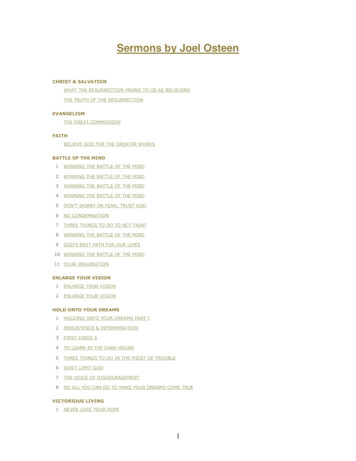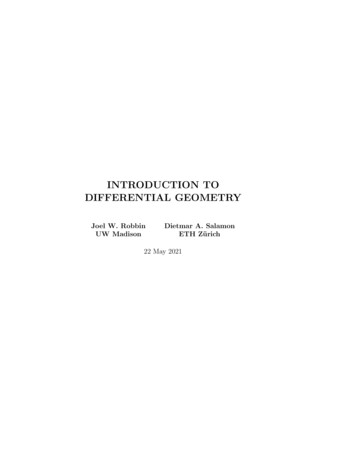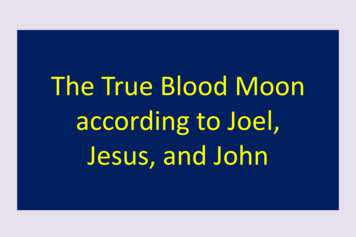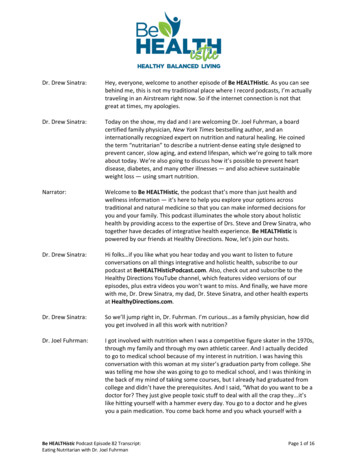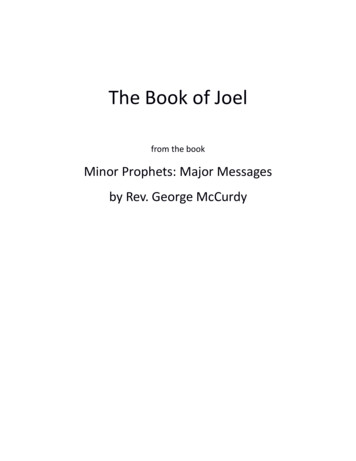
Transcription
The Book of Joelfrom the bookMinor Prophets: Major Messagesby Rev. George McCurdy
ContentsHow To Use This Study Guide. 4Introduction. 5What do we know about Joel?. 5Can we put Joel in a timeline with the other prophets?.6Is Joel mentioned or quoted in any of the books of the Word?.6Are we familiar with any of the passages from Joel?.7What are the major themes of Joel’s prophecy?.7And lastly, what specific lesson or lessons in Joel’s prophecy are useful for theNew Church?. 8Chapter One. 10Joel 1:1-3. 10Joel 1:4. 14Joel 1:5-7. 18Joel 1:8-13. 25Joel 1:14. 33Joel 1:15. 36Joel 1:16-17. 39Joel 1:18-20. 44Chapter Two. 49Joel 2:1-3. 49Joel 2:4-9. 55Joel 2:10. 632
Joel 2:11. 67Joel 2:12-17. 70Joel 2:18-19. 79Joel 2:20. 82Joel 2:21-25. 86Joel 2:26-27. 93Joel 2:28-29. 95Joel 2:30-31. 98Joel 2:32. 103Chapter Three. 108Joel 3:1-3. 108Joel 3:4-8. 113Joel 3:9-12. 119Joel 3:13-15. 123Joel 3:16-17. 130Joel 3:18-19. 135Joel 3:20-21. 141Epilogue: A Summary of the Three Chapters of Joel.144Chapter One. 144Chapter Two. 145Chapter Three. 1453
How To Use This Study Guide1. A careful, unhurried reading of Joel is essential. Reading the chapter beforelooking at the notes, while working with the notes, and after finishing withthe notes will give each researcher a powerful sense of the series of meaningswithin each chapter. It is important to be comfortable with all the names andplaces in the prophecy and to understand the announcements the prophetmakes on behalf of the Lord. When possible, historical information will beincluded in the notes to increase reading comprehension and enhanceapplication.2. Our study of each chapter of Joel will begin with quotes from a work of theWritings called Summary Exposition of the Prophets and Psalms. This workincludes a verse-by-verse overview of all three chapters of Joel that providesgeneral information about the internal sense. Our research will help move usfrom the generals to the particulars of the internal sense.3. Another important reference tool is Searle’s General Index to Swedenborg’sScripture Quotations. This reference is used to find passages in the Writingswhere a verse(s) from the Word is either explained specifically or used toillustrate a doctrinal point that we can use in our study. There is also anotheruse of this work. As we study, each researcher will be led by the Lord’sProvidence in myriad ways, according to specific needs or states. Knowinghow to use this book will help each of us to explore relevant topics and lookup related passages to increase our knowledge of the three-fold Word.4. You will soon discover that not every verse, word, name, etc. is directlyquoted in the Writings. But there are often other references to the samename, place, or thing in the explanation of a different verse of the Word. Thehope is that reflection on these other doctrinal explanations will help us seepossible applications to our study of Joel. We will need to use "deriveddoctrine" often. Please don’t run away from this maligned term. If we use itproperly and admit openly that it is derived doctrine, we bring no harm to theinternal sense.5. Keep some kind of notebook handy during your study times. Write outinsights, questions, and any summaries you find helpful in organizing yourthoughts about each chapter. The goal of this study guide is not to give adetailed summary of the internal sense but to start each researcher’s questfor deeper insight.6. At the end of each chapter in the study guide, you will find a study review.The review includes a summary of each section to help you reinforce andbuild on your understanding of several of the key points.7. Begin each study unit with a devotional prayer asking the Lord to guide anddirect your thoughts. Certainly, beginning in this sphere has the power toinspire and open our minds with a higher spiritual priority that will keep usin the company of the Lord’s angels. As the Writings teach, we must seek tolove truth for truth’s sake. Such an approach will free each reader from4
preconceived ideas that might limit his or her ability to "see" the intent andmessage of the Lord’s Word.IntroductionAs we prepare to take up the study of Joel, let’s pause for a moment and learn whatwe can about the historical prophet Joel. The six questions listed below will guideour quest for information.1. What do we know about Joel?2. Can we put Joel in a timeline with the other prophets?3. Is Joel mentioned, or quoted, in any other books of the Word?4. Are we familiar with any of the passages from Joel?5. What are the major themes of Joel’s prophecy?6. And lastly, what specific lesson or lessons in Joel’s prophecy are useful for theNew Church?WHAT DO WE KNOW ABOUT JOEL?Joel 1:1 reveals almost everything we know about this prophet. We know his nameand the name of his father. Joel means "Yahweh is God." Some scholars note that thename Joel appears to be a combination of the two names of the Lord—Yahweh andElohim.Knowing the name of Joel’s father, Pethuel, doesn’t help us. Apparently, Pethuel wasnot a significant person in the history of Israel because there are no other referencesto him in the Word. We have no hint of what kind of life or work Joel did prior to hiscall from the Lord. Was he a priest? We don’t know. Can we pinpoint where he livedin the land of Israel? Not really. Scholars assume that he lived in Jerusalem. Did theLord call him from royal, priestly, or common stock? Was Joel, like Amos, a man whowas not one of the "sons of the prophets"? There are no answers to these questions.From a New Church perspective, it seems to be of the Lord’s Providence that wedon’t know Joel’s personal history. It helps to keep us from focusing on the person tothe detriment of our study of spiritual principles.5
CAN WE PUT JOEL IN A TIMELINE WITH THE OTHER PROPHETS?No! Scholars are undecided about the dates of Joel’s birth and death, and about whatking or kings reigned at the time of his prophetic calling. Among scholars, there isvery little agreement on the years of Joel’s prophecy: One theory proposes that he lived during King Jehoshaphat’s reign: 872-848BC.Another suggestion is that he lived during the period 792-740 BC.A third suggestion places him at 597-587 BC.And the last scholarly opinion has Joel living around 515-500 BC.Why are these "guesses" so diverse? Joel’s prophecy gives no historical clues. Hementions no king. We are left only with "the timeless message of the Lord."Again, we do well to ask why the Lord would keep the dateline so unclear. Is it tokeep our minds steady and focused on the spiritual sense and not on people, places,and time/space concepts? I think we would agree that this seems to be a goodreason for a vague timeline. We shouldn’t try to put the Word of the Lord in a finitecontext. We shouldn’t worry if we can’t make God conform to our spatial concepts.The Word is the Lord’s, and it has been preserved so that it may be studied toeternity. Angels don’t read names or dates. They behold the spiritual sense and drawon the illustrations (immediate influx) that come from the Lord. We need toremember to emulate this approach as a goal while reading the Word.IS JOEL MENTIONED OR QUOTED IN ANY OF THE BOOKS OF THE WORD?There are twelve references to a "Joel" listed in Young’s Bible Concordance. Most ofthe twelve references to "Joel" occur in First and Second Chronicles and Nehemiah(11:9), which are not books of the Word. There is one reference to Joel in Acts 2:16.The only reference to a "Joel" in the Word occurs in I Samuel 8:2.Here is a list of the places a "Joel" is mentioned in the Old Testament:1. The eldest son of Samuel was named Joel (I Samuel 8:2). This son of Samuel isalso mentioned in I Chronicles 6:28, 33, and 15:17.2. I Chronicles 6:36 mentions a Levite priest named Joel.3. I Chronicles 4:35 identifies a chieftain of the tribe of Simeon named Joel.4. An early leader in the tribe of Reuben was named Joel (I Chronicles 5:4, 8).5. A chieftain of the tribe of Gad was named Joel (I Chronicles 5:12).6
6. A chieftain of the tribe of Issachar was named Joel (I Chronicles 7:3).7. Joel, the brother of Nathan, was a tough hero in David’s army (I Chronicles11:38).8. A Levite of the Gershon tribe was named Joel (I Chronicles 15:7, 11).9. A Levite, the son of Ladan, was named Joel (I Chronicles 23:8 and 26:22).10. A Levite, the son of Azariah, was named Joel (II Chronicles 29:12).11. There was a son of Pedaiah, who ruled over half of the tribe of Manasseh,named Joel (I Chronicles 27:20).12. A son of Zichri, of the tribe of Benjamin, was named Joel (Nehemiah 11:9).Acts 2:16 quotes Joel 2:28-32.ARE WE FAMILIAR WITH ANY OF THE PASSAGES FROM JOEL?You will probably recognize more passages than you would imagine. I have listedhere what I think are the major ones you have heard most often in our churchservices:1. Joel 2:12-13: "Turn to Me with all your heart, with fasting, with weeping, andmourning. So rend your heart, and not your garments; return to the Lordyour God, for He is gracious and merciful, slow to anger, and of greatkindness "2. Joel 2:28: "I will pour out My spirit on all flesh; your sons and yourdaughters shall prophesy, your old men shall dream dreams, your young menshall see visions "3. Joel 2:31: "The sun shall be turned into darkness, and the moon into blood "4. Joel 3:10: "Beat your plowshares into swords and your pruning hooks intospears "This fourth passage in Joel is the opposite of Isaiah 2:4 and Micah 4:3: "They shallbeat their swords into plowshares and their spears into pruning hooks "WHAT ARE THE MAJOR THEMES OF JOEL’S PROPHECY?1. The sensual person has destroyed the church.7
2. The Word has been scattered and stripped of its spiritual dignity.3. The Word has been falsified.4. Spiritual insanity reigns among the people of the dying church.5. The day of the Lord is coming.6. The day of judgment is coming, and there will be a great battle.7. The Lord calls for repentance.8. Sincere repentance will save the people (remnant).9. The Lord will establish a new church.10. The Lord offers acquittal to those who turn from their wrongful ways.11. The people should be aware and respond; the Day of the Lord is here.12. There will be a new illustration of the Word. People will see how the Wordapplies to their lives.13. When this comes to pass, the church will be the Lord’s and the church willbe from the Word.AND LASTLY, WHAT SPECIFIC LESSON OR LESSONS IN JOEL’S PROPHECYARE USEFUL FOR THE NEW CHURCH?All too often, we worry about the slow growth of the New Church. Why isn’t theGeneral Church membership in the thousands or millions? Why are other faithgroups doing so much better? Is the spread of the Lord’s New Church on earth evergoing to happen?This nagging worry distresses us with a vague feeling that maybe we are "hitchingour spiritual wagon" to a dying cause. The teaching of Joel is a pep talk. It contains amessage of hope. The Lord is going to establish the church. He will win the spiritualwar that is going to be waged. The New Church will be His, and His Word will catchhold of the world. But, there must be a consummation of the falsity that is still in ourworld. The sensual side of humanity is still very much alive. The sensual is impatientwith the Lord. Looking beyond the moment is not an interest of the sensual person.The emphasis on faith alone or knowledge alone is an enemy of the conjugialprinciples of the Lord’s Church. These things temporarily disperse the ideas of theLord. The locust attack mentioned in Joel depicts wave after wave of sensual8
philosophical and scientific arguments against the church. It appears that they havestripped the church and the doctrines of the Lord barren.In Joel’s prophecy, we hear this message: "Stay alert! Respond, for the Day of theLord is at hand. Don’t lose sight of the end. The New Church is the Lord’s, and HisWord will be the core of the Church."Will it happen? Will the battle bring victory to the Church? The prophecy of Joelpreaches a positive end. It will come, and the Lord will gather His "remnant"together to start a church that will be the crown of all churches for ever and ever.These things will come about because of the Lord, not the efforts of any group ofpeople. So we need to be watchful and listen for the spiritual trumpet of the Lord.Hell and its menacing legions will not overcome the Lord. The Church will win, notbecause of our strength but because of the Lord’s strength.Joel 3:10 has a teaching worth remembering and saying to ourselves often:"Let the weak say, ‘I am strong.’"I hope you read Joel with this sense of victory and strength in "the Day of the Lord."9
Chapter OneJOEL 1:1-3"The word of the Lord that came to Joel the son of Pethuel. ‘Hear this, you elders, andgive ear, all you inhabitants of the land! Has anything like this happened in your days,or even in the days of your fathers? Tell your children about it, let your children telltheir children, and their children another generation.’"Passages From The WritingsSummary Exposition of the Prophets and Psalms (P&P) "To all who are of the church."Derived Doctrine"The word of the Lord " Arcana Coelestia (AC) 2 explains the nature of the Lord’s Word. " of necessity[the Word must] contain within it such things as belong to heaven, to thechurch, and to religious belief unless it did so it could not be called theLord’s Word, nor could it be said to have any life in it" (emphasis added).AC 129 teaches us, "the true order is for man to be wise from the Lord, that is,from His Word, and then all things follow, and he is enlightened even inmatters of reason and of memory–knowledges "" that came to Joel the son of Pethuel." "Coming" or "came" signifies communication by influx (AC 5249). What kindof influx is meant here? Was it "mediate" or "immediate"? The passageidentifies the Word of the Lord coming to Joel; thus, it seems sensible todecide this refers to immediate influx because that which comes directlyfrom the Lord involves immediate influx. Mediate influx, on the other hand,refers to that which comes through angels or some other indirect means.We have not a single teaching about the meaning or correspondence of"Pethuel." A New Church minister, the Rev. James Hyde, wrote: "The namePethuel is derived from "pathu", which means ‘induced,’ To induce signifies,in a bad sense, to entice, or beget a deceptive infatuation." (An Exposition ofthe Prophecy of Joel, pages 47-48.)Joel’s name means "Jehovah is God." Looking at the meanings of these twonames (Joel and "pathu") in a positive light, could they signify that the Lord10
wanted to positively induce and entice the people to have a true "infatuation"with His Word?A "son" signifies a general truth (AC 3496). Sons signify those not born withinthe church, or nations who are remote from goods and truths and who havenot been inculcated with the goods and truths of faith; sons also signify thosewho are in external worship (Apocalypse Explained [AE] 1133 [3])."Hear this, you elders, and give ear, all you inhabitants of the land!" To "hear" means to be in a state of obedience (AC 2691). Hearing signifies thatone who understands should obey what the Word teaches. Hearing means toboth perceive and obey. See Apocalypse Revealed (AR) 87 and AE 588."Elders" signify those who are wise and in a wisdom that agrees withgood(AC 5608 [7] and AC 6524).To "give ear" signifies that one who understands should obey what the Wordteaches so that he or she might be made ready to be of the New Church,which is the New Jerusalem (AR 87)."Inhabitants of the world" signify people of the church who are in the goodsof doctrine, and so of life (AE 741 [6]). "Land" signifies the region where thechurch is—where the faith of the church resides (AC 2571)."Has anything like this happened in your days, or even in the days of your fathers?" Questions are asked by the Lord to help us to seek either knowledge orconfirmation (AC 1913 and AC 2693).The people of Judah experienced a devastating drought and a locust plaguethat stripped the land of its vegetation. The question asks the reader toreflect. Was this event simply "bad luck"? Was this a natural misfortune, orwas it a significant happening of divine (providential) proportions?"Your days" signify a kind of review or assessment of the successive states ofregeneration (AC 6). "Days" and "years," in the Word, signify the states oflife(Heaven and Hell [HH] 155).What about the "days of your fathers"? Could this question be a mandate toJudah to review the inherited tendencies toward evil they received from thepresent and prior churches? Could it be that the Lord wanted them to thinkabout the inherited tendencies toward evil they had passed on? The questioncould also suggest that they should review the inherited tendencies towardgood they received from the churches of their fathers. Both are importantpoints to reflect on when considering the Lord’s providential leading."Tell your children about it, let your children tell their children, and their childrenanother generation." AC 2862 explains that "telling" signifies to indicate, to come to know, toinform, or to be informed. Reflection is also an internal telling.11
"Children" signify bringing forth things that belong to one’s spiritual life (AR534). Offspring have birth from the marriage of the Lord with His church.Children are the offspring of goods and truths (Conjugial Love [CL] 121).A "generation" signifies those who are perpetually being created anew (AC1041).Does this teaching about perpetually being created anew seem to apply to themeaning and process of children telling children?Putting It All TogetherTo begin putting all of these ideas together, it is important that we look at thecontrast within two passages relating to the three verses of Joel we are studying.First, let’s look at the quote from P&P that proclaims that this is a message: "To all who are in the church."Secondly, let’s look at the question Joel asks: "Has anything like this happened in your days, or even in the days of yourfathers?"P&P directs the reader’s attention to the inclusiveness of the Lord’s message: "To allwho are in the church." The Lord’s reaching out to all shouldn’t be missed. TheDivine cares about all in the church. The Lord invites all to listen to His Word. Joel’sname means "Jehovah is God"; therefore, all need to have the ears of obedience forthe things of the Lord. The Lord calls all to His Word because it contains and offersthings that belong to heaven. His Word offers things that are essential for thechurch. The Word is vital for our system of religious beliefs. Seeking the Lordthrough the Word opens the way for the powerful sphere of immediate influx. TheLord will give "obedient ears" the vital, intuitive insights needed to thrive spiritually.Within the heart of every believer, there has to be some inducement, enticement,and infatuation (love) for the Word. Joel, "Jehovah is God," calls for the "elders," orthe wisdom of the mind, to teach and improve the understanding within the churchso the people can respond obediently. The elders represent the degree of wisdomthat readies a willing worshipper to become a member of the New Church—the NewJerusalem.Choosing the Lord’s way will open to us a life that is peaceful, productive, and happy.Casting the Lord off invites and prepares the way for unbelievable spiritualdisasters, the magnitude of which has never been seen before, nor can they bedescribed. Hence we have the catastrophic story and frightening events alluded to inthe second quote: "Has anything like this happened in your days, or even in thedays of your fathers?" What natural and spiritual events did Joel point to? Joeldescribes four kinds of locust, one after another, swarming and entering the land toconsume all the vegetation therein. In effect, Joel asks: Can you believe the travesty12
of this experience? Tell this story so as to warn the generations of children to come.It is a story of vital importance. "HEAR" is the first command following Joel’slineage. Hearing requires a willingness to obey.The full extent of this locust message is covered in our next section.Read and ReviewRead the selection from P&P.Read Joel 1:1-3.Questions to Stimulate Reflection1. Did you notice how much we needed derived doctrine to help give us a largerglimpse of the spiritual sense of the first three verses? What did you think ofthis?2. Are you clear on the point of the two contrasting passages? Obedience meansgiving ear to the Lord and His Word. Ignoring the Lord and His Word bringsabout spiritual calamities of unbelievable proportions. Can you think of anypersonal examples of these life states?3. Can you describe the difference between immediate influx and mediateinflux?4. What did you think about the point of Joel’s father’s name being a derivativeof a word meaning inducement, enticement, and infatuation? Can you see thepossibilities of these inherited tendencies, if they are tendencies towardgood, being a part of the Lord’s working through Joel?5. How well do we do our job of telling the generations of our children about theeffects of our choices? Is it enough to count on our New Church school systemto do it for us?6. Think of the song, "All that the Lord has spoken we will do and hear." Everwonder why the doing occurs before the hearing? What are your thoughtsabout this?7. The word "elders" can have a wide range of meaning. Elders signify truths ofwisdom learned. They can be the remains built up and protected by the Lord.The elders are caregivers for the preparation and building of the New Church.Do we listen to them often enough? What can they offer us?13
8. New ideas are great. Our scientific achievements have given us longevity andgreater freedom. Have we brought new ideas into our hearts and mind toaugment or complement the elders?JOEL 1:4"What the chewing locust left, the swarming locust has eaten; what the swarminglocust left, the crawling locust has eaten; and what the crawling locust left, theconsuming locust has eaten."Passages From The WritingsP&P "Falsity from the sensual man and afterwards evil therefrom has consumedall things of the church."AC 7643 [7] "In Joel 1:4 ‘locust’ denotes falsity in the extremes vastating truths andgoods."AC 7643 [8] " by ‘locust’ are signified reasonings from fallacies and the falsities thencederived, also confirmed by philosophical things. Thus also by the ‘locust’ aresignified the falsities which are in the extremes with man, and which aremore earthly and corporeal than all other falsities; and by which man may beeasily deceived and seduced, for he apprehends what is obvious to the senses,and with difficulty what is opposed to the senses."AC 9331 [5] In Joel 1:4 " falsities and evils in the extremes—that is, in the externalsensuous of the man of the church—are signified by the various kinds ofinsects here mentioned for the subject treated of is the perversion of thetruth and good of the church."AR 424 "It is in consequence of falsities in the outermost parts consuming the truthsand goods of the church, as they spring up in man, that they are signified by‘locusts,’ which consume the grass and the herbs of the fields, as may beevident from these passages " Joel 1:4 is cited.14
AE 543 [9] "The ‘locust’ and the ‘caterpillar’ have a similar signification in Joel 1:4 Evidently these noxious little animals signify falsities and evils devastating orconsuming truths and goods with the man of the church "Derived Doctrine"What the chewing locust left " "Chewing" signifies taking knowledges from the memory and analyzingthem(Divine Providence [DP] 233 [8]). Chewing the cud signifies thinking overthings once learned and believed (AC 5135 [2]).AR 794 teaches that "them that are left" represent those "who do not searchafter [truths] nor receive them, because they are in falsities "" the swarming locust has eaten " AC 2122 describes the state of those who desire to become "the greatest."They think of nothing but what is filthy, obscene, and profane. They makenothing of and utterly despise all things that are of charity and faith. They donot acknowledge the Lord. They hate all who confess the Lord. Thesedescriptions are followed by this statement: "At the present day such peopleflock [swarm] into the other life ""Swarming" in the positive sense refers to goods, multiplying to truths (AC1014 and 1016).To be "eaten" signifies to communicate, be conjoined, and to appropriate (AC2343).In the negative sense, to "eat" signifies to live for self and the world and thusto appropriate evils and falsities (AE 840 [5])."What the swarming locust left, the crawling locust has eaten " "Crawling" signifies pleasures from the senses. When such pleasuresoriginate from the proprium and lusts, the senses become filthy (AC 594).That which crawls signifies thin
mourning. So rend your heart, and not your garments; return to the Lord your God, for He is gracious and merciful, slow to anger, and of great kindness " 2. Joel 2:28: "I will pour out My spirit on all flesh; your sons and your daughters shall prophesy, your old men
